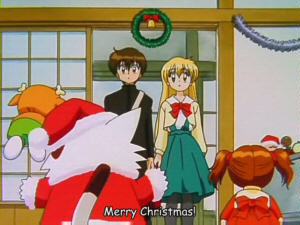Wednesday 18 August 2004

|
Pic of the day: Screenshot from the Christmas episode of the anime Daa! Daa! Daa!. And yes, they actually say "Merry Christmas". The jule-animeI've bought another e-book from fictionwise.com: How to learn a foreign language. It doesn't actually try to teach any one language, but rather prepares the student for the wickedness of non-American languages. The book strongly recommends buying a tape recorder so you can listen to the language a lot, for instance from broadcasting. It also recommends that you practice the foreign sounds by exaggerating them. I guess it was that particular point that made me think of The Julekalender. A few years ago on Norwegian national broadcasting there was a TV series called "The Julekalender". The name was well chosen, for even I can't say I've heard the English word. Some of you may understand it if I spelled it the way it would be spelled in English, Yule Calendar. It would literally translate to "Christmas Calendar", but I guess they are not such an important part of life there as here. It's a way of counting down to Christmas, and typically contains a small gift for each day. Christmas calendars for kids usually contain a snack or a small toy for each day, but there are also some for grown-ups containing for instance a lottery ticket. Anyway, this story was also counting down to Christmas. It had elves, I think they were supposed to be, and some stuff. I don't have a TV, I just saw a couple episodes at my best friend's place while enjoying her company (this was a few years ago, while I still had a best friend). I also bought the CD, which is great fun, because like the show itself it contains a wild mix of Norwegian and English. And that is why I thought of it. Most Norwegians that are born after the war know some English from school, and the young ones know a lot. In fact, I believe most people under 30 will understand English well enough for a simple conversation, even if they don't use it in their work or need it in any other way. Quite a few of us understand it a lot better, witness the wide selection of English books and magazines for sale in many shops in Norway. But being the blue-eyed recluses we are, we hesitate to actually speak it for fear of making some minor mistake. That's where this show comes in: It portrays people who are utterly unconcerned about their inability to speak English correctly. Whenever they don't know an English word, they just substitute the Norwegian equivalent and move on. Teachers praise the show because it encourages kids to practice their English even if it is not perfect. (Since practice makes perfect, it is kinda self defeating to wait until you are perfect before you practice, but it is a tendency we have.) People who want to protect the Norwegian language(s) from English influence are of course up in arms: This is exactly how our language will finally meet its fate, when people start mixing Norwegian and English without a second thought. Or perhaps not. ***I've been watching a lot of anime over the last year or so. (That's Japanese cartoons, for those who still might not know, but with a very unique style.) One thing I notice is that Japanese mix in English words effortlessly in their songs, and sometimes when they speak. At least the young, modern folks do. But conversely, many anime fans in America use Japanese words the same way. In fact, it is often the same words, or reasonably close in meaning. So while the Japanese kids say "Cool!" the American otaku say "Kakkoi!" and when the Japanese say "Thankyou" the Americans say "Arigatou" It is quite funny once you notice it. Right now, there are probably more Japanese mixing in English than the other way around, but the distance is closing as Japanese manga has all but pushed American comics down from the throne and sells like hot cakes in the States. And even I find myself coming up with Japanese words suddenly from time to time, although I have the sense to not say them to other people. Then again, I don't say much to other people at all. I already think fluently in English, although there are some concepts that I only can think in Norwegian. Then again, there are others that I only know in English – languages are not all clones of each other just with a different word for each thing. And now I'm starting to mix in Japanese too. Although I have no idea what a Yule calendar would be called in Japanese. Gomen nasai! (So sorry!) ^_^* |
Yesterday <-- This month --> Tomorrow?